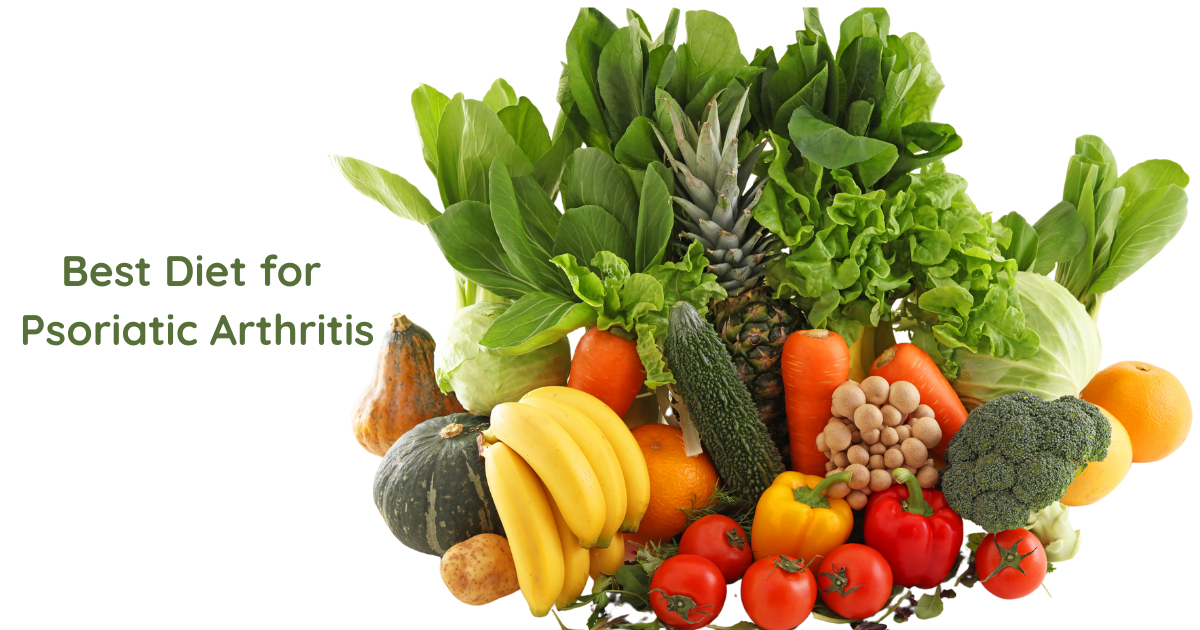Psoriatic arthritis (PsA) is an autoimmune disease that affects the joints and can also lead to skin symptoms like psoriasis. It causes pain, inflammation, stiffness, and swelling, particularly in the joints, making daily tasks challenging. While medication plays a critical role in managing PsA, a balanced diet is also crucial in reducing inflammation, supporting joint health, and improving overall well-being.
By focusing on foods that help reduce inflammation and avoiding foods that may trigger flare-ups, you can help manage the symptoms of Psoriatic arthritis. Let’s look at the best diet for PsA, including foods to embrace and foods to avoid.
Foods That Help with Psoriatic Arthritis
- Omega-3 Rich Foods
Omega-3 fatty acids have strong anti-inflammatory properties, making them excellent for people with Psoriatic arthritis. These fatty acids help reduce inflammation in the body and may alleviate joint pain.
Best Sources of Omega-3:
- Fatty fish like salmon, mackerel, sardines, and trout
- Flaxseeds and chia seeds
- Walnuts
- Fish oil supplements (if you don’t eat fish)
2. Leafy Green Vegetables
Leafy green vegetables are rich in antioxidants, vitamins, and minerals, which help reduce inflammation. They are high in vitamin K, which plays a role in bone health, making them a good choice for PsA patients.
Top Choices:
- Spinach
- Kale
- Swiss chard
- Collard greens
3. Berries
Berries are packed with antioxidants, which protect the body’s cells from damage caused by oxidative stress. These antioxidants can help reduce inflammation and may improve the symptoms of PsA.
Top Berries to Include:
- Blueberries
- Strawberries
- Raspberries
- Blackberries
4. Olive Oil
Olive oil is rich in monounsaturated fats and contains a compound called oleocanthal, which has natural anti-inflammatory effects similar to nonsteroidal anti-inflammatory drugs (NSAIDs).
How to Incorporate:
- Use olive oil for salad dressings or cooking at low to medium heat.
- Add it to roasted vegetables or pasta for a flavorful and healthy option.
5. Nuts and Seeds
Nuts and seeds are rich in healthy fats, fiber, and protein. These nutrients help support joint health and reduce inflammation. Walnuts, in particular, are high in omega-3 fatty acids, which are beneficial for PsA patients.
Best Nuts and Seeds:
- Walnuts
- Almonds
- Flaxseeds
- Chia seeds
6. Whole Grains
Whole grains contain more fiber than refined grains, helping to control inflammation and maintain a healthy weight. Fiber also helps regulate blood sugar, which may be important since some PsA patients may also have metabolic syndrome.
Good Whole Grains Include:
- Brown rice
- Quinoa
- Oats
- Whole wheat
7. Turmeric and Ginger
Turmeric contains curcumin, a compound known for its anti-inflammatory properties. Ginger also has anti-inflammatory effects and may help alleviate joint pain. Both spices can be added to meals or consumed in teas to enhance their anti-inflammatory benefits.
Ways to Use:
- Add turmeric to curries, soups, or rice dishes.
- Brew fresh ginger tea or add it to smoothies for an anti-inflammatory boost.
Foods to Avoid with Psoriatic Arthritis
- Processed Foods
Processed foods are often high in sugar, unhealthy fats, and preservatives, all of which can contribute to inflammation. They may worsen PsA symptoms by increasing inflammatory markers in the body.
Common Processed Foods to Avoid:
- Fast food and fried foods
- Sugary snacks and sodas
- Packaged baked goods
- Instant noodles and microwave meals
2. Red Meat
Red meat, especially fatty cuts, contains saturated fats, which can increase inflammation and worsen symptoms of PsA. It is best to limit red meat intake and opt for leaner protein sources.
Red Meat Alternatives:
- Lean poultry (chicken, turkey)
- Fish (salmon, mackerel)
- Plant-based proteins (tofu, lentils)
3. Nightshade Vegetables
Some individuals with PsA may find that nightshade vegetables exacerbate their symptoms. Nightshades contain solanine, a compound that may trigger inflammation in sensitive individuals. However, not everyone with PsA is affected by these vegetables.
Nightshades to Avoid or Limit:
- Tomatoes
- Potatoes
- Eggplant
- Bell peppers
4. Dairy Products
Some people with PsA experience worsened symptoms after consuming dairy products. Dairy can cause increased inflammation in some individuals, especially those who are lactose intolerant or sensitive to dairy proteins.
Dairy-Free Alternatives:
- Almond milk or soy milk
- Dairy-free cheese
- Lactose-free yogurt
5. Refined Carbohydrates and Sugars
Refined carbohydrates and sugars, such as those found in white bread, pasta, and sweets, can trigger inflammation and increase blood sugar levels. These foods may contribute to weight gain, which can put additional strain on the joints.
Better Alternatives:
- Whole grain breads and pasta
- Natural sweeteners like honey or stevia (in moderation)
6. Alcohol
Excessive alcohol consumption can increase inflammation and may interact negatively with medications used to treat PsA. It’s essential to limit alcohol intake to prevent flare-ups and support overall health.
Alcohol Guidelines:
- Limit alcohol to one drink per day for women and two for men, or avoid it completely if advised by your doctor.
Conclusion
A well-balanced diet plays a crucial role in managing Psoriatic arthritis and improving overall joint health. By focusing on anti-inflammatory foods, such as omega-3-rich fish, fruits, vegetables, and healthy fats like olive oil, you can help alleviate symptoms. On the other hand, avoiding processed foods, red meat, and nightshade vegetables can prevent flare-ups and reduce inflammation.
As everyone’s body reacts differently to various foods, it’s essential to observe how specific foods affect your PsA symptoms and work with your healthcare provider or nutritionist to create a personalized diet plan.





